#in stars and time analysis
Explore tagged Tumblr posts
Text
I'm kinda peeved off that I'm seeing a few people that have the critique that Siffrin didn't deserve their "happy ending" in the end, that he was forgiven too quickly. I'm bad about this for actually a number of reasons.
(Warning this will be long because I am irrationally passionate about this, totally not because I relate to Siffrin or anything ahahahahaha)
First, logically, Siffrin's actions definitely are not as awful as people make it out to be especially not in the context of a time loop story. The worst Siffrin has done was his actions in the Bad Touch achievement and the last loop, one being purely optional. Outside of that, any tampering Siffrin had done was purely harmless, sure it's existentially horrifying but it's not like he did any actual manipulation.
You could also argue since Siffrin was in control of the loop, they are responsible for everything that was happening but we know full well he wasn't in control literally, his emotions were in control of the loop. Considering, a whole thing in this story is how acting as though you're fine and trying to control your emotions don't work, I don't think we can make the argument Siffrin was really in control.
He only wanted to trap everyone in the timeloop when it already had destroyed his mind. I thought it was obvious it was a monkey's paws situation.
The last time loop was the breaking point of Siffrin and it's one of the things he does suffer consequences from, they do get mad at him and he does apologize. What else do you want him to do ?
The Bad Touch achievement is the only thing that could be said to be "unforgivable" but it's optional and as far as I know it's hinted that Siffrin would talk about it with Isabeau. In fact it's said that even though right now they're fine and okay, they literally say they are okay to be mad at Siffrin later.
And also, it's not taking into acount the Actual feelings of his family either. They can't remember the loops and they have their own reason to not still be mad with him, so why should they hold Siffrin accountable for feelings they don't have.
In fact, the storyline strikes the perfect balance to not have Siffrin do such horrible action that he'd actually be unforgivable but still have him do enough that it shows what the loops are doing to him but....
..it's not just logically, judging Siffrin's actions as bad/good things like that is not just what's wrong with the narrative that Siffrin should've suffered more consequences. It also goes against the narrative itself.
For me at least, ISAT is a game about mental illness but also recovery. It's not coincidental a lot of people project their own mental issues onto Siffrin, it's not just a "ahahaha they're so relatable !!", it's a genuine part of the story.
I could make an entire essay about it but that's not the point, what would a story about these themes be if the ending was just "you need to repent for the things you did during your own mental breakdown"
It may seem ridiculous after all this that they'd just forgive Siffrin after all of this, but really hasn't most of the points against Siffrin's morality been coming from Siffrin themselves.
Siffrin believed he deserved to be rejected, that he deserved the suffer, that he was disgusting. It was these belief that kept him from talking about the loop because for him, everything was his fault. Not just because he created the loop but because the desire of staying with them was the very sin he hated himself for since the beginning.
So for all that self hatred to be met with, strange acceptance. It almost seems ridiculous, and Siffrin's talk with Odile in the epilogue reinforces how almost comedic it is.
It's close to reality, isn't it ? How many times have you thought you did something completely unforgivable to someone you cared about and you were waiting for them to be furious at you, but that moment never came.
Because they just simply weren't hurt enough by what happened. And sure it was definitely a bad thing you did and they were maybe mad in the moment, but you apologized. Sure there could be more consequences for what you did but what's the point in asking for them to be more mad at you ?
Shouldn't you strive to be better than beg to be hurt for your actions ?
Do you think being hurt, being yelled at would make anything better other than just feed the voice in your head what it wants to hear ?
Weird flowery talk aside, it just doesn't fit the themes and the narrative of the story is what I'm saying. Asking for more punishement for Siffrin goes against what the story is about.
It's just like complaining that the looping mechanics are too frustrating, that's part of the package deal bb !!
Fuck the idea of "repenting by suffering through the consequences" !!! Having to deal with "blinding unrelenting forgiveness and kindness" is in !!!!
#isat#in stars and time#in stars and time spoilers#siffrin isat#siffrin#in stars and time analysis#isat analysis#siffrin isat analysis#saying this to tumblr feels very much like talking to a mirror because ik there are a lot of siffrin pics out there ready to agree with me#but it's not like i'm gonna make a youtube video about it and most of the comments relating to that came from there#it's obviously not a lot i don't think as i've only seen two instances of it#but it's still enough to peeve me off#so i needed to make this
187 notes
·
View notes
Text
how ISAT makes you feel like going home
so one of my friends said to me "the first time i played (isat) was when i was home sick, i felt like it had curative properties. analyse that mr playstyle 😎" and i took it as a fucking challenge. i've never written an (tumblr-posted) analysis essay before and i'm going into this with a bunch of haphazardly folded ideas and NO OUTLINE fuck it we ball
so to begin with: DORMONT.
isat, as a whole, is extremely a traditional rpg setup. which unfortunately i know little to nothing about, so forgive me in advance if i put my foot in my mouth regarding traditional rpg mechanics. but like many games, you start at a home base, at home. and the whole vibes of the place honestly serve to only emphasize the safe / at home / storybook atmosphere isat cultivates. you wake up in a field, sleepy and tired. your dear friend mirabelle leans over you and tells you to wake up, because you're going to beat the king tomorrow! and you laugh and you're sleepy but eventually you start playing. eventually, you push yourself up and wander around and meet the townsfolk and your party.
now, the player doesn't know the party. they've just opened the game! they don't know these characters. siffrin does though, and it shows in the interactions he has with each one of them. mirabelle teases siffrin about the quality of his nap. isabeau puns with siffrin. odile smiles at him. bonnie... looks away, because of backstory you don't have yet, because you're leaping into this story at its very end. but siffrin knows.
(...)
siffrin knows. which informs his narration, of course, and overall it gives the sense of - you're watching a story already known, with characters who already love each other. like walking into a family home midway through a dinner party, to know and be known in turn.

(you know where you are. you're home!)
siffrin provides some exposition of course, enough to catch the player up and let them know the basics of the world you've set foot into. these people are here because they have natural ties, connections to the land they've been born or raised in or are travelling through. you all are here to defeat the king, who is the epitome of a traditional storybook villain, the big bad evil you defeat at the end of the fairytale. he's just the generically evil guy, with no focus given to the atrocities he must have committed and been willing to commit in order to get where he is. there's no need to be scared of him, not really. (yet.) he's evil, but in the way a storybook villain is evil. all the sharp edges defanged, sanded away, all the humanity and dimensionality and violence inherent in his character compressed into a set of scribbles on the page, words on a screen. it's not personal. it's not.... scary. not to you, and not to siffrin, who's already been floating above it all.

(the rest is under a cut! spoilers for The Entire Rest Of The Game)
similarly, the exposition is in the form of little childlike drawings, emphasizing the same nostalgia it draws on - fairytales, fables, those stories where the heroes collect the magic sword and slay the dragon and save the princess. you know these stories, consciously or not. you love these stories, (probably), and it all serves to emphasize the familiarity with which you step into dormont. heroic stories are extremely common in the stories we love today, from the old classic prince charming to (somewhat) more modern legend of zelda, and no doubt many people picking up isat have a similar passing familiarity with the overarching story of rpgs. (i in fact was the exception, but that's a whole other essay)
the townspeople definitely do not help this vibe as well. they are practically one and all kind, steady people, precisely the sort of common folk you'd want to save in a story where nothing hurts and everyone is safe and loved. they're happy to gift you a flower or a pan au chocolat and cheer you on in your quest, certain of your victory and at least certain of their continued happiness even if you fail. simple, easy, familiar, comforting in the way redwall is comforting or an old set of childhood fairytales is comforting. there's no real judgement, no anger at you for potentially failing and (almost) none of the gross ugly real emotions that would be present in a more 'realistic' story. simple, easy, familiar, comforting.
(You like knowing what happens next!)
so. i think we all know that isat at its core is a game about homesickness. god's sakes mal du pays is literally right there. the central conflict of this game, beneath the overlaying fluff of an rpg archetype and an evil to defeat, is about siffrin not being able to go home while the rest of his party get to do so. and even at this very early stage (approximately act 1 and i would argue a bit into act 2) you can start to see the cracks. siffrin is shown alone, tagging along with the party because he had "nothing else to do" (read: nowhere else to go.) he laughs and pals and jokes with the party, but like before, like always, he merely mirrors them. he makes puns with isabeau because isabeau likes puns, and siffrin liked making him laugh so much so that he adopted puns into a part of his personality. he comforts mirabelle about her future, jokes with odile about her research, and always, always, avoids talking about himself. when they ask where he's going to go after their journey is over, his answer is always a mirror of their own - pilgrimage, research, travel, comedy. when he makes a wish at the favor tree, there's no option to wish for himself.
because the thing is, right. siffrin never thinks of himself. the only options instead are to wish for his family - his home, his only living and real connections in his life, the people surrounding him that really make dormont feel like a real home and not just another friendly place in vaugaurde he's passing through. cause the townsfolk are nice, sure, they're friendly, sure, but - they don't know him. they're not important enough for him to literally rewrite his personality for them. it's his party instead, that he laughs and jokes with and is known with, even if superficially. he wants to be allowed to go home, to stay home. he's been homeless both literally and figuratively for so long that he's beyond desperate to be allowed to keep what little he's found for himself.
(You want to stay with them!)
except - what happens when you beat the game? what happens when you finish the rpg, when you reach the end of the book, when you grow up and leave this set of children's fairytales behind?
you put it down, right? you go home, right? you go back to your home, you go back to travelling, you go back to your family.
what do you do when you don't get to go home? when dormont and the clocktower and the house are the closest you will ever get to home, are the last moment you will ever have being home before it's ripped away from you forever? (ripped away from you just like before - )
you'd want to stay, right? forever and ever and ever?
siffrin is a character who has a very bad time letting go. just like the king, he wants to have, desperately, enough to kill himself a hundred times over for it. and, through the timeloop, he can pull you, the player, and himself and his hapless party along through the timeloop, repeating the same two comforting days over and over and over and over.
and perhaps after a few loops of settling in you, too, can understand why he would want to do this. it's nice, isn't it? knowing what will happen? knowing that these people will always love you? knowing that you can always get the flower, always get the drawing, always get the pan au chocolat, always beat the tutorial kid and get the jackpot? that the townsfolk will always smile at you, that your party - your family, your home - will never know what you've done?
it's not enough, isn't it?
(Dormont, unchanging! Dormont, stagnating!)
no matter how hard siffrin tries to cling to the past turned present to stave off his inevitable future, he is still human. under the fairytale setting and pretty lights, even under his own desire to stay with them, he needs that human connection. he needs something to change, to give way. needs to be seen, to be known, to be loved for himself and not because he's learned the perfect pretty words and actions to trick them into loving him. you, the player, the person driving siffrin, can understand this frustration perfectly as well - you need something to change. you need something to give way, because you can't keep doing this. because you can't hear the same lines over and over and over anymore. you can't do the same thing over and over anymore. you're not happy. siffrin's not happy. something needs to change.
i finished isat over the course of about four days, playing about 12-14 hours per day. during that time, i experienced possibly the most deeply intensely felt emotion i have ever experienced. to this day when i look back on my first playthrough of isat, the sheer depth and fury of that emotion takes my breath away.
and it was frustration. just like siffrin, i was trapped. i couldn't look away, because i loved these characters, because i loved their story, because i wanted them to keep going and going and living and i wanted to keep living alongside them. but i couldn't keep going like this. i couldn't do the same thing over and over and over. i needed something to change, but both siffrin and i were desperately, agonizingly trapped in the same few days. the same places, the same faces, the same lines said rote until i was zoning out through every dialogue interaction, only pausing when i needed to make sure that i hadn't missed something new.
because i loved these characters. i loved how homely they felt. i loved them, i loved them, i -
needed them to be real. to change, to grow, to have their future returned to them. i needed to see them go home, not trapped in this same endless time-frozen loop. i had been trapped at home too long, and the cabin fever was eating me alive. my desire to be allowed to keep playing (to stay in the timeloop) was duking it out with my desire to see them change beyond what they were allowed to change in the span of just two days. i wanted to see bonnie grow up, to see isabeau change into someone else, to see odile come to terms with her half-vaugardian nature, to see mirabelle learn to accept her sexuality (or lack thereof). i wanted them to remember us as family.
ah, isat, absolute king of getting in my head and making me think like siffrin.
back to dormont. in the end, dormont only changes permanently in act 6, after the time loop breaks. the only time the townsfolk ever change, ever coherently move to different places and act differently (act 5 is similar, but i would argue that's because siffrin changes, dormont still doesn't really meaningfully change) is after the loops.
and it's fitting, isn't it? by this point in the game, you could recite dormont backwards and forwards. but by this point in the game, you are well aware that you need to give them back a future. their future. the one they wished for in the first place. they've been trapped in their fairy tale wonderland for long enough. they deserve to go home, truly home, to go forward and live their lives and keep moving on. to allow them to change, to grow.
to allow yourself to change, to grow. to allow yourself to go home, to admit that you want to keep your home you have now, to keep the family you've built from blood and death and tears and stars.
(You want to stay with them!)
to leave dormont. to leave this fairytale behind, and keep living.

#isat#in stars and time#isat analysis#in stars and time writing#isat writing#dasner speaks#isat siffrin#isat dormont#dormont#isat spoilers#this is just me rambling furiously for uh. several hundred words at least#hope you enjoyed! no promises on quality but i just had a lot of thoughts i needed to get out somehow#in stars and time analysis#this was a lot of fun ngl. i don't let myself ramble like this very often bc i don't think i have much coherent to say#still don't think this was super coherent but i liked it. and i had a lot of thoughts i wanted to get out that got out finally in here#so !
65 notes
·
View notes
Text

drew some totally normal sadnesses
blank bg and individuals below the cut
edit: i posted some of my thoughts that went into these designs! if youd like to read you can find it in the reblogs







#in stars and time#isat#isat spoilers#isat fanart#isat siffrin#isat mirabelle#isat isabeau#isat odile#isat bonnie#isat loop#cw body horror#< just in case#aves art#two hats spoilers#im sorry if the names are awkward i dont speak french.....#might make a companion post to this detailing my thought process#because boy did i think#yes i know about mdp i love mdp . but i wanted to draw goopy freaks more in line with other sadness designs#this is like character analysis in the form of creature design
5K notes
·
View notes
Text




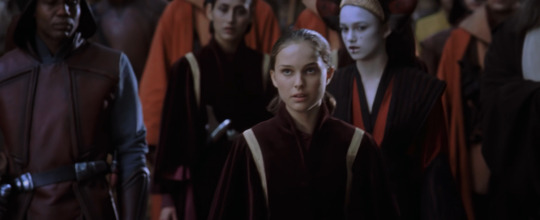







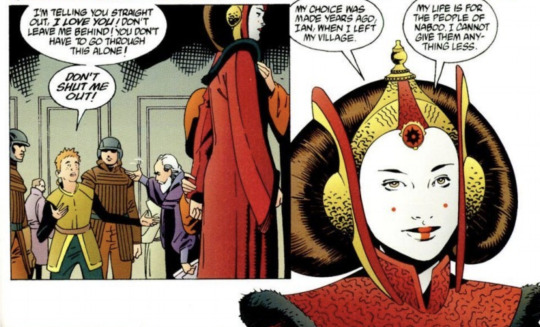

the empty queen: my life is for the people of naboo
star wars meets the eras of feminism, valerie estelle frankel / attack of the clones script third draft, cut dialogue / the phantom menace script / anne carson / judith herman / star wars tales #5, terry moore / constance grady
#having a good time with 'eras of feminism'! even when i disagree. just nice to read feminist sw analysis that isn't a listicle#padme amidala#web weaving#the phantom menace#attack of the clones#star wars prequels#prequel trilogy#star wars
2K notes
·
View notes
Text
We as a community should talk more about how Siffrin feels so (subconsciously) jealous of Odile.
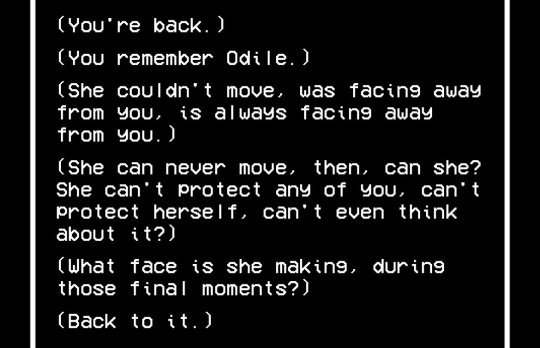
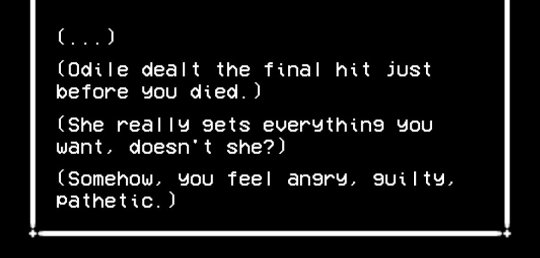
In his eyes, Odile is just a better version of him. More capable, better at combat, catches onto small details better, overall just smarter, more controlled about her feelings, etc.
It all just makes him feel even more useless than he felt before, because why would his family need him if they have the oh-so-perfect Odile, right?
But this envy only gets worst during Act 4, as Siffrin doesn't only see Odile as someone just better than him...

He sees her as privileged.
To him, Odile doesn't care about the one thing he has cared about other than escaping the loops and his friends. She doesn't care about her roots, something Siffrin has been grasping to remember for a long time.

To see someone so casually dismiss her origins as "unimportant" to who she is as a person, it justifiably makes Siffrin angry, because having even the chance of looking for anything related to your past seems like the greatest gift to be given.
As much as Siffrin loves Odile and his family, there's an undeniable envy and distrust towards her that eventually explodes in Act 5.
#this game makes me so ill i swear#in stars and time#isat#in stars and time spoilers#isat spoilers#analysis#(?) i guess#in stars and time siffrin#isat siffrin#Siffrin#siffrin isat#siffrin in stars and time#in stars and time odile#isat odile#odile#odile isat#odile in stars and time
444 notes
·
View notes
Text
Do you ever think about how growing up in a country where wishes were seemingly so prevalent might explain a lot of Siffrin’s inner logic and turmoil?
What if he was conditioned from a very young age to always be careful about his own wishes and how he must always make sure they don’t clash with the greater good ? Maybe it’s drilled in children’s minds that being greedy is the literal worst thing you could ever be? (We don’t want kids wishing for 1000 ponies after all!)
What if it distorted itself into a toxic life philosophy when it wasn’t tied to its original context? Always somewhere in the back of his mind, something telling him to not be greedy, not be selfish etc when realistically, without wish craft in the mix, wanting things is not... bad.
The moment he makes his wish at the favor tree comes to mind. He automatically takes into account everyone else’s wishes before making his. He doesn’t want to “divert” attention from the big important wishes, like “saving Vaugarde”, but he assumes that this wish is already accounted for, so he wishes for something he considers small and unobtrusive. (Ha)
His obsession with being useful, being serviceable, putting his own problems behind everyone else’s. Hating himself whenever he does speak up. It all starts to make a little more sense, at least to me? He simply can’t be greedy! Being greedy, or even being SEEN as greedy is disgusting and wrong and could have so many bad repercussions on everyone!!
451 notes
·
View notes
Text
Female Guidance in Aventurine's Life

One thing I haven't seen discussed in much depth yet, but which I think is especially interesting, is the consistency of female guidance in Aventurine's life: Every single person who we have seen on screen offering Aventurine assistance or making a positive difference in his life is female (with one exception, yes, I'll get there).
Under the read more cause it's longggg:
Before even diving into his family, let's just get the obvious out of the way: Aventurine is, at least supposedly, blessed by a goddess. The very origin of his good fortune--be it actual blessing or curse--comes from the literal "mother goddess" who watches over him. This is one of the only instances in Star Rail where a god character is specifically given a gender, and Gaiathra is not ever ambiguous. She is the classic female fertility goddess with all the trappings of other famous triple goddess figures of the real world. Aventurine's personal belief in the goddess may be shaky, but he nevertheless continues to treasure his people's faith. Thus, at the core, we can say Aventurine is a character who is guarded by the most quintessential mother figure possible.
Now, with the most obvious out of the way:
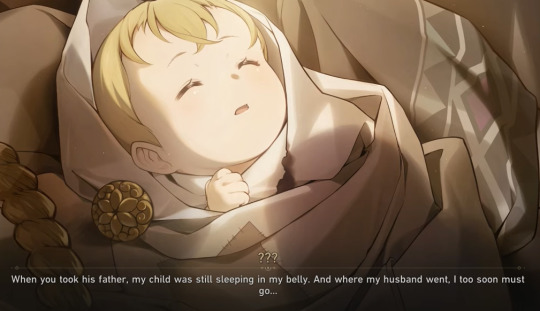
We know that Aventurine's father died before Aventurine was even born, and therefore he would not have any memories of his father, leaving him to be raised by his mother and sister.
Both women clearly made an enormous and lasting impression on Aventurine; they haunt every single one of his memories of Sigonia and are the key elements of the family Aventurine longs to return to. While he flirts with the concept of death as a way to see his family members again, it was also his mother and sister who instilled in him any sense of self-worth and meaning to his existence, the only things keeping him from giving up on living. His mother believed him to be blessed; his sister insisted to his face that not even the only remaining remnant of their mother had any value in comparison to his life.
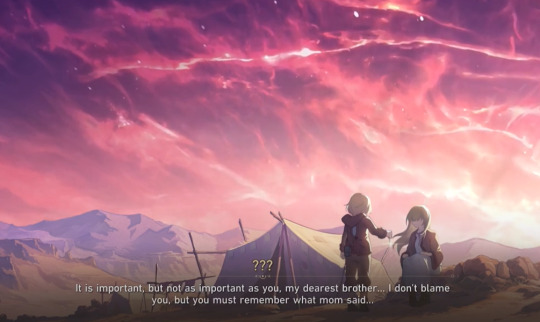
It is for his sister that Aventurine first begins expressing a self-sacrificial nature, and from his sister that this self-sacrifice is reinforced when she uses herself as a shield to help him escape massacre at the hands of the Katicans.
It is also from his sister that Aventurine learns many of the deeply meaningful actions he holds onto to the present day, despite having been so far removed from his own culture.
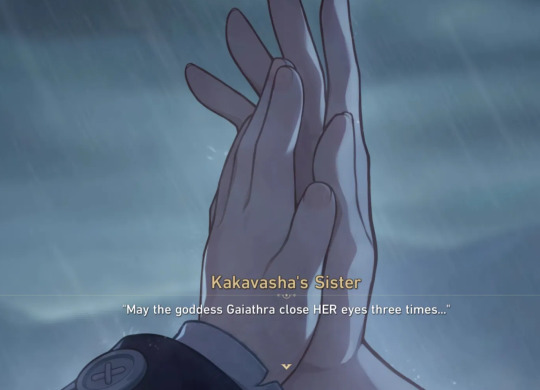
Conversely, every one of Aventurine's early negative experiences on screen appear to have been driven (at least primarily) by men.
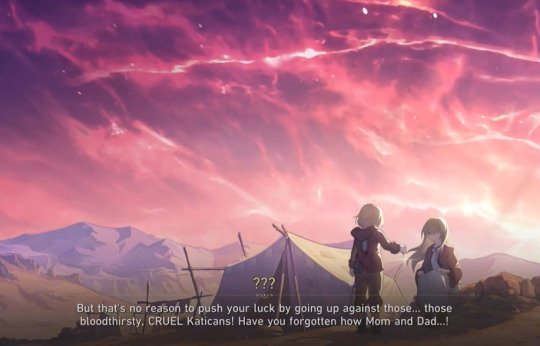
Although the Katican tribe of course would have both men and women, the tribal societies on Sigonia appear to be on the fairly traditional side, with Aventurine's mother staying at the camp with her child while his father was the one to go out and hunt for offerings for Gaiathra. This is also supported by Aventurine asking Jade to take him to her "chief" later on. Therefore, it is likely (although of course not guaranteed) that a majority of the Katicans' army was male, and that Aventurine's early experiences with outsiders consisted almost entirely of indiscriminate pillaging and massacre at the hands of what the Avgin viewed as savage, invading warriors. In separate instances, Aventurine was traumatized by these warrior figures three times--first with the loss of his father, then his mother, and then finally his sister.

And even their hope, supposed to come in the form of the "men in black" from the IPC, completely abandoned them, leaving Aventurine once again betrayed by masculine figures that were supposed to be there to protect him. Led by Oswaldo Schneider, another cruel male authority figure, the Marketing Department of the IPC permitted the wholesale slaughter of Aventurine's people--something which we know Aventurine is now aware of.
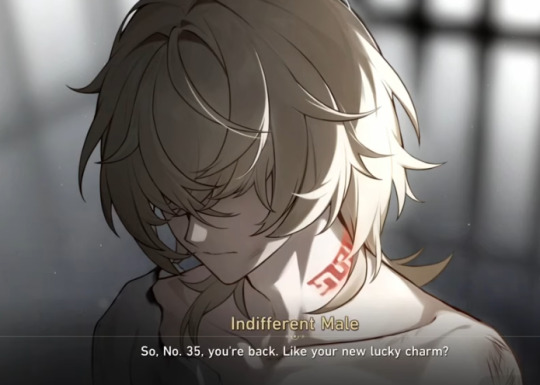
Then, of course, the next piece of Aventurine's backstory we're given is his male slave master. I don't really need to say anything about this, do I? This man violated Aventurine's human dignity and bodily autonomy, and forced Aventurine's hand in a life or death battle for which Aventurine still punishes himself mentally, even years in the future.
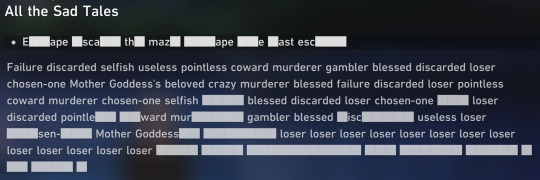
In part to escape the difficulty of his situation and rise to a position where he would have enough resources to--he thought--help his people, Aventurine joins up with the IPC. But when he attempts to make contact with a powerful man in the organization, Diamond, he is instead met by a woman, Jade, who against Aventurine's own expectations determines that she will raise Aventurine up (or use him as a tool, depending on how you currently choose to interpret Jade's motivations), granting him wealth and status beyond his imagination.
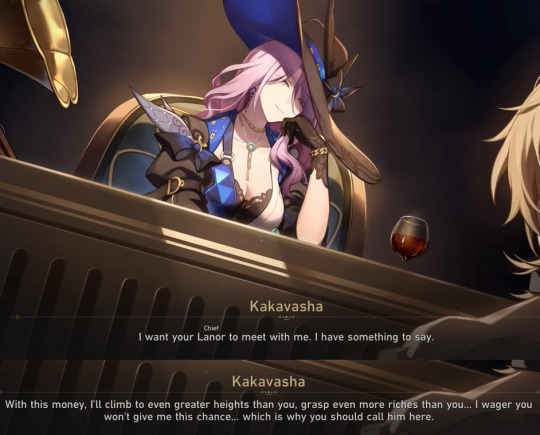
(And this line in particular is interesting, because you can take it one of two ways: 1) Aventurine comes from a patriarchal planet that traditionally put men into positions of power [thereby making his own slavery an emasculating act, aligning him further with disenfranchised women]; thus, he is making the assumption that to get anywhere in this organization, he will need to work with a man; or 2) He actually was counting on Jade taking his bet and helping him right from the beginning, because Aventurine perceives women as inherently more likely to protect and aid him than men would be.)
In the end, Jade does exactly as she claims she will, launching Aventurine into a position of power while also closing golden handcuffs around his wrists. She positions herself not only as his supervisor, but as his advocate and ally. She entrusts him with her Cornerstone, a sign of significant faith in his abilities. She even seems to be keenly aware of his bias towards the mother figure, referring to him as "child" in their conversations.

Whether this is genuine or a manipulation tactic can certainly be debated (and I'm not inclined to think at this point that Jade is a genuinely good role model or selflessly supportive person in Aventurine's life), but whatever the case, women are the only people Aventurine even remotely considers to be "in his corner."
We see this even earlier, in Aventurine's call to Topaz. Like with the example of his mother and sister, Aventurine trusts in Topaz's ability implicitly, and considers her above anyone else when it comes to completing the mission in Penacony.
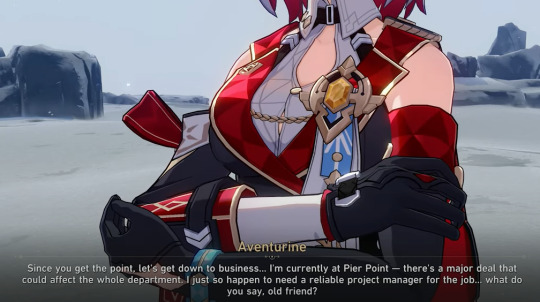
Although of course we don't know if Aventurine has any other friends or allies among the Strategic Investment Department, it seems very likely that Topaz, yet another woman, is the one he is closest with. At the very least, she is the only IPC character (so far) that Aventurine has a complimentary voice line for, one that shows his respect for her talent:

Over and over again, the story aligns Aventurine with female figures in positions of authority, and demonstrates that he is comfortable (although maybe not too comfortable, in the case of Jade) with relying on them and trusting their judgment, just as he did with his mother and sister.
And this pretty much goes off the charts in Penacony, where Aventurine has more involvement with the female cast than virtually any other non-female character (even the Trailblazer!). We set the pattern off right away, with Aventurine immediately being placed into a negotiation situation with Himeko, respecting her role as the Express's leader and working to get himself aligned with the Express by acquiescing to her request for support.
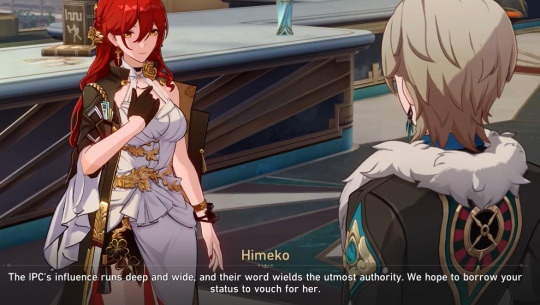
Then there's the fact that Aventurine is the one who finds Robin's body, an event which, although he didn't let it show too much, was almost certainly traumatic for him, given the violent death of his own sister.
Next, twice in Penacony's story, we see Aventurine seek out Sparkle for information. He may not personally like her and her comments may be both racist and dehumanizing, but Aventurine does rely on her--being the only character explicitly seeking her aid, which no one else in Penacony seems to want.
In 2.0...

And in 2.1.
Now, say it with me, guys: Aventurine built an entire portion of his grand plan around the idea that if he looked pathetic enough, a female character would absolutely come and help him. And sure enough, the women come through for him, always! Sparkle gives him the exact last clue he needs to confirm his belief that he could use "Death" to reach the true Penacony, sealing the deal for the rest of his plan.
His plan which also hinged significantly on Black Swan's involvement too, another woman that he views as, if not trustworthy, then at least intelligent and hyper-competent.
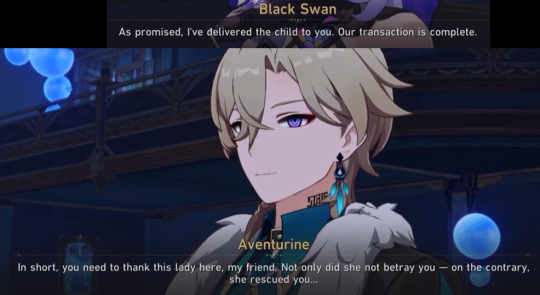
Contrast all this, of course, with the treatment Aventurine receives at the hands of Sunday, the lone opposing male character he faces in Penacony.
Sparkle implies that Sunday would humiliate Aventurine in an unmistakably sexual and degrading way, and Sunday himself professes this same desire to see Aventurine humiliated.
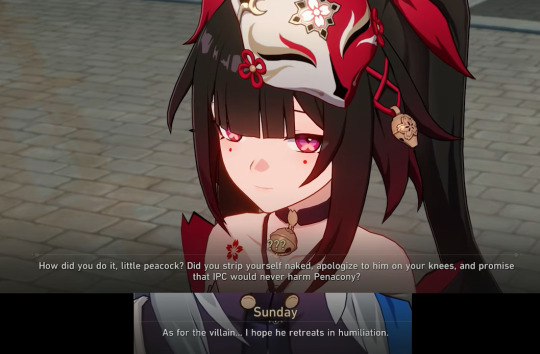
Then we're "treated" to the moment in which Sunday uses the Harmony's (or perhaps actually the Order's?) power against Aventurine, in a scene which is supposed to reflect an interrogation but is also, very clearly, another nonconsensual violation of Aventurine's bodily autonomy and dignity by a man. While ostensibly seeking confirmation of the Cornerstone ruse, Sunday instead subjects Aventurine to unnecessary questions about his past on Sigonia, which recall and force Aventurine to re-endure memories of his trauma.
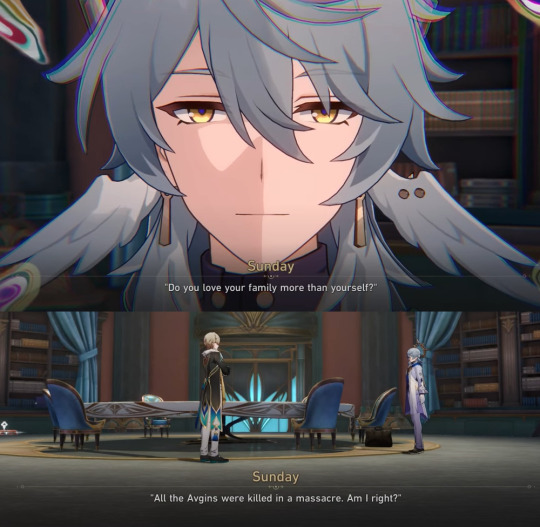
Even if this is what Aventurine prepared himself for and planned to have happen, the pain he experiences is very real, and he suffers both the physical and emotional consequences of Sunday's assault all the way up to his "Death" and possibly even beyond.
(Also, Sunday fans please don't get too up in arms with me for this; I also like Sunday! It's okay for characters to be morally grey!)
I think there's one other interesting example I would bring up here too, and that's Aventurine's conscious decision to weaponize his own masculinity against the Trailblazer. Through the 2.0 and 2.1 Trailblaze missions, Aventurine deliberately acts in an off-putting manner to the Astral Express crew, particularly the Trailblazer, in order to build up to the 2.1 climax where the Trailblazer is supposed to view him as an unrepentant villain and attack him without hesitation.
In order to achieve this uncomfortable, villainous effect, what does Aventurine do? Exactly what other men have done to him.
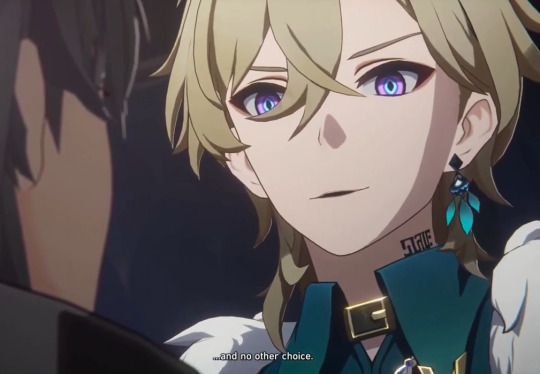
This is especially apparent if you're playing Stelle because of the ingrained societal taboo of a man entering a woman's personal space without consent, but even as Caelus, it is very clear that Aventurine is leveraging behaviors typically used to show dominance: In a complete 180 to all Aventurine's other body language in the game (normally quite withdrawn, frequently in defensive postures with his arms crossed or hand behind his back, almost always standing several feet away from other people), Aventurine violates the Trailblazer's personal bubble, looming over them (Caelus was sitting in this cutscene, lol), forcing eye contact, and commanding the space while informing them that they will have no choice.
For someone who was hunted, enslaved, had his movements restricted with chains, and due to his own slight stature has very likely been towered over by others who were intentionally asserting their power over him all his life, it is clear that Aventurine associates dominant, typically more masculine-coded physically-imposing behaviors with discomfort and even villainy.
Any girl who has ever had a man loom over her like this will realize very quickly: Aventurine wanted to make himself scary so he made himself act more like a bad man.
(Yes of course I know "not all men." I'm not saying every man behaves in this domineering way or that women cannot be domineering too, obviously, just that Aventurine had a very specific image in mind when constructing a "villainous persona," and the physically controlling tactics most typically used by aggressive men toward women was his immediate go-to.)
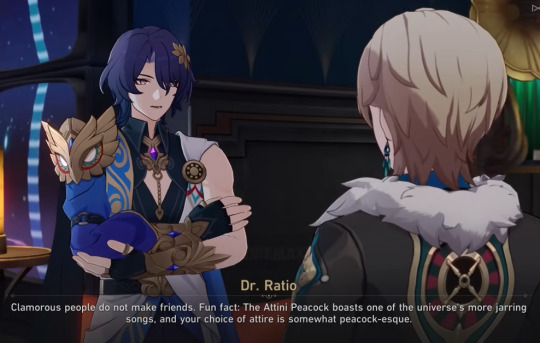
But where does that leave Dr. Ratio, the one male character actually on Aventurine's side?
Frankly, I don't want to derail my post about how intensely Hoyo chose to hammer on the message of "Women will protect you" in Aventurine's story with a discussion about a mlm ship, but the take-away here is going to lead in that direction anyway--so yes, Dr. Ratio is the exception.
What is interesting is that he does not come across as an exception at first, and in fact initially appears as another male character being rude and dismissive to Aventurine. Like, there are still people out there calling Ratio an unrepentant racist for this one.
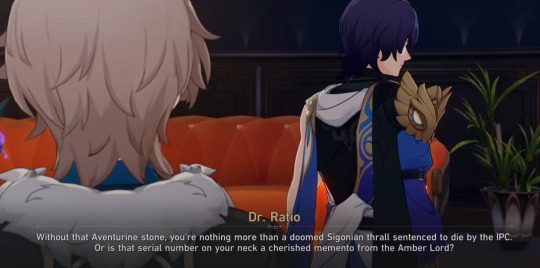
Of course, it's later clarified that this is an act--likely even these insults were scripted specifically to give Sunday's spying ears the "insight" he needed to exploit Aventurine during the interrogation.
But even though it is an act, Aventurine still has noticeable trouble putting his faith in Ratio. He does genuinely doubt him a few times, despite knowing that they are working together to fool the Family.
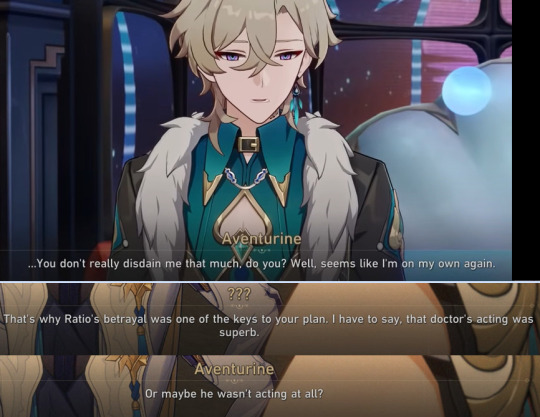
Even his voice line about Ratio confirms that he doesn't think Ratio particularly cares for him; rather, he thinks Ratio simply tolerates him because he's slightly less unintelligent than those around them.
Ultimately, the entire act with Ratio ends up being a mirror of the real scenarios Aventurine has been experiencing with men his whole life (at least as far as we are shown his life). Men abandon him to fend for himself (unwillingly, like his father, or willingly, like Diamond leaving Aventurine to deal with Penacony alone on the inside). Ratio keeps leaving Aventurine completely alone. Men attempt to humiliate him and violate his boundaries (like Sunday and his slave master). Ratio insults Aventurine's appearance and intelligence repeatedly. Men betray him (like Oswaldo Schneider and his men leaving the Avgin to die). Ratio "betrays" him.
I'm not saying when Aventurine devised the plan for their act, he consciously drew up a list of all the ways men had hurt him in the past and had Ratio re-enact them one by one, but like... that's what happened, whether or not Aventurine intended it.
And okay, the shrinking scene in Dewlight Pavilion was just for fun and probably only slightly fetishy, the devs promise; yes, it was supposed to be a joke! ...But it's also not a mistake that this is yet another instance of a male character in a glaringly metaphorical position of power over Aventurine. Aventurine's tiny in this scene! He's completely vulnerable! He's in a dangerous position and the male character could very much hurt him in this moment.

But Ratio doesn't. (In fact, his line here is supposed to be sarcastic, very ha ha--but also, what is Ratio really saying? "I won't do anything to you without your express consent." What a good guy.)
Virtually everything negative that we see in 2.1 is Ratio doing these things as an act at Aventurine's own request. He doesn't actually disdain Aventurine; his own voiceline about Aventurine reinforces that he sees Aventurine as talented and intelligent.
Whatever you think he was apologizing for in their early scene, he's the only person we're ever shown in-game apologizing to Aventurine at all.
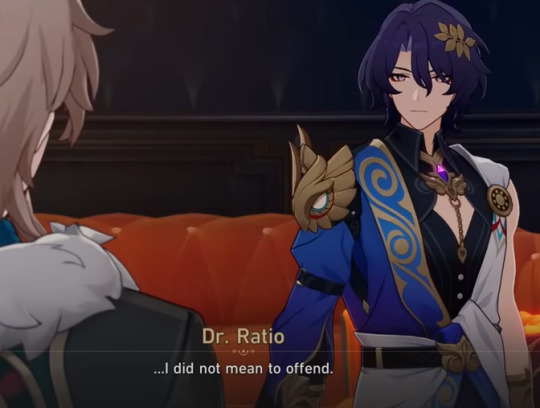
He worked hard to "betray" Aventurine but only as he was instructed to do, and immediately checks in on Aventurine's well-being afterward, even urging him to give up the plan if it becomes too much to handle.
And then, of course, there's the note: "Do stay alive. I wish you the best of luck."
After this point, it cannot be denied that Ratio is unequivocally on Aventurine's side, wants to help him, and is not doing so out of any sense of self-gain but largely because he is a good person who simply cares about Aventurine's fate. By the end of 2.1, it can no longer be doubted that Ratio is the exception to the "gender rule" of Aventurine's life, which--the story shows us again and again--was that guidance, protection, and care for Aventurine come from women, while men repeatedly represent dismissal, betrayal, or pain.
Ratio is, at least as far as Aventurine's story shows us, the proof that men can be good, that things are not as black and white in Aventurine's life as they might appear, and that--if you do choose to ship him with or see Aventurine as attracted to men--his attraction could be validated (and potentially reciprocated) by a male figure who would not bring additional harm to Aventurine's life. Aventurine makes the final decision to live after seeing Ratio's note--the exception to the rule ultimately proves to be the last piece needed to keep him alive.
But I promised I wasn't going to derail my own post about w o m e n, so let me get to the final point, and the one I really wanted to talk about: Although Ratio gets virtually all the credit for "saving" Aventurine in the fandom, Aventurine was actually saved by, you guessed it, another woman.
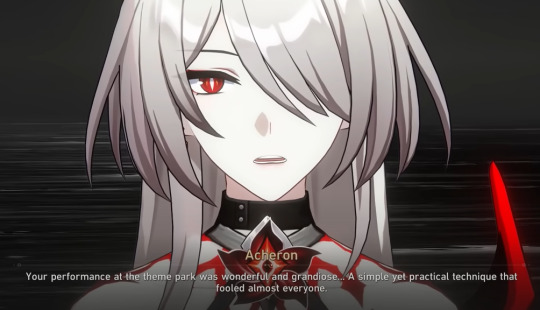
Not going to lie, the reason I started this post was specifically because I wanted to talk about how Acheron and Aventurine's dynamic was completely unexpected but actually fits flawlessly with the theme of feminine guidance in Aventurine's story.
Despite the fact that Aventurine made Acheron's life much harder and actively used her as a chip in his grand gamble, she doesn't blame or chastise him for those actions. Although she expresses some incredulity that Aventurine is actually that lucky, she then turns around and congratulations him for his ingenuity, immediately supporting him despite the fact that they don't even truly know each other.
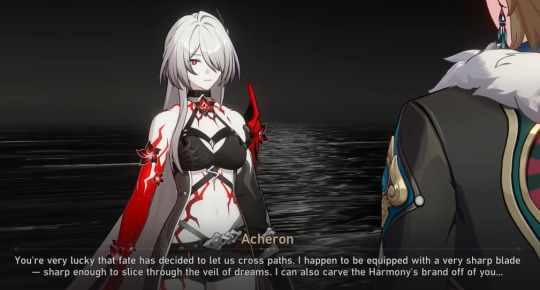
Then it gets even more interesting. Acheron, who frequently hits her companions with deep and sometimes very emotionally fraught questions, asks Aventurine: "Have you never wavered?"
We as players know for a fact that Aventurine is constantly wavering, constantly doubting himself, his luck, and whether he'll even live--or even wants to live--to see tomorrow. But we also know that Aventurine is not forthcoming about those truths, refusing to express them to anyone, even himself. The only way we hear those dark truths is through his "future" self (who by the way, is once again another male figure cutting Aventurine down--of course it's himself but it's also, from the player's perspective, once again reinforcing the message that he isn't going to find safety or kindness in an adult male presence). Aventurine almost constantly deflects and diverts when his emotions or struggles are brought to the fore (unless he's divulging them for the specific purpose of allowing someone else to weaponize them). "I'm fine," he says, like a lying liar who lies.
But he doesn't lie to Acheron.

He chooses to be completely candid with her, to lance open the deepest wound of his life--that he can win and win and win and still have lost everything. The glitz and the glamour has all been stripped away here, at the end of everything, and Aventurine finally feels safe enough to admit that he fears he has absolutely nothing in his life worth living for.
And then, we get this direct parallel: Aventurine looks to Acheron, the woman now before him, for guidance, for explanation, exactly as he looked to his sister in the past.
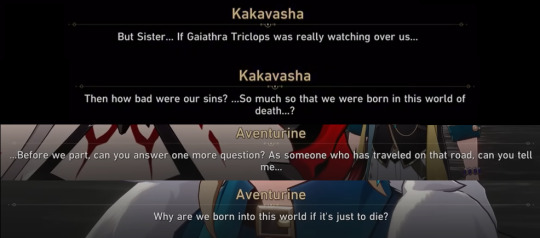
He needs help, he needs answers, and he is continually seeking that help from the female figures in his life, whose support and kindness echo the lost care of his mother and sister.
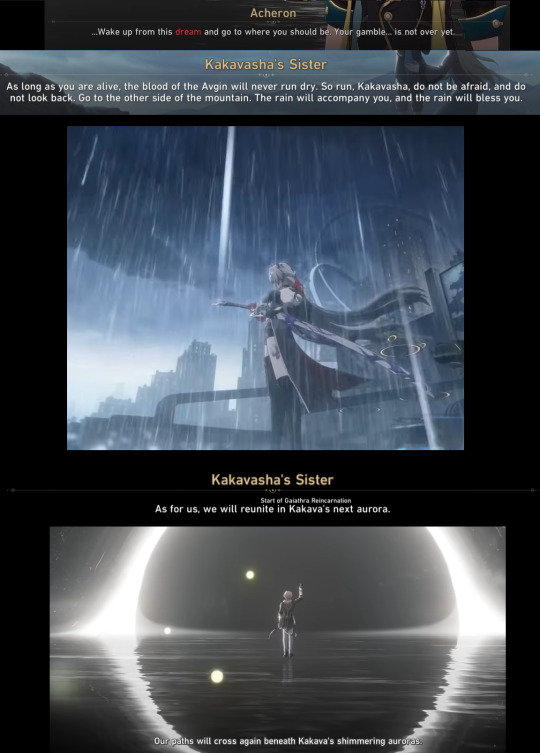
"Go where you should be," Acheron tells Aventurine, guiding him across the river of death just as his sister insisted that he flee through the rain toward life.
Look guys, Acheron's even the one who reminds Aventurine to look at Ratio's note in the first place because apparently being an emanator of Nihility gives you x-ray vision, but my girl just gets no credit at all for being Aventurine's real savior, come on now!! Yes, Ratio's note was the final reminder Aventurine needed that someone would be waiting for him on the other side, but Aventurine would never have even gotten to the point of being willing to read that note if Acheron hadn't stepped in and provided him an answer to his question.
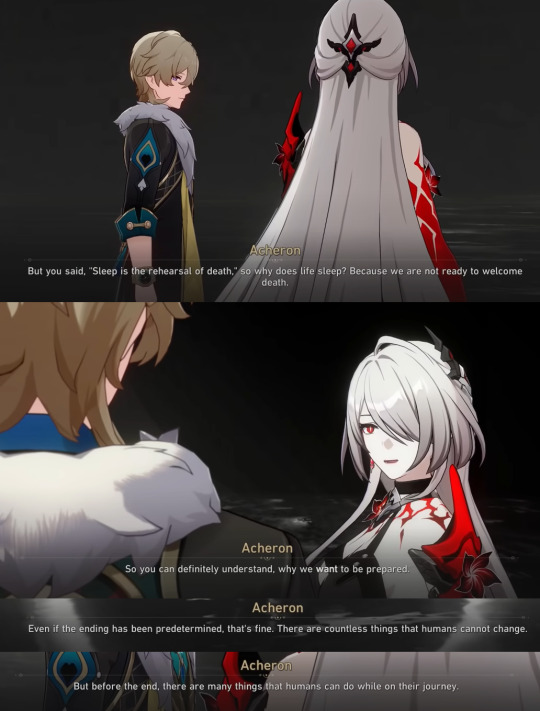
She feeds him back his own answer: "Why does life slumber? To rehearse the death for which we are not currently prepared." It is Acheron who reminds Aventurine that giving into the Nihility is pointless, and that rather than simply embracing a meaningless death, it is up to humanity itself to find and make meaning by living. It's this, not Ratio's note, that Aventurine gives as his reason for choosing to go on when asked by his own younger self. It's Acheron's words that finally give Aventurine an answer--why do we live just to die? Because there are people we can still make proud. Because when we go into death, we should do so with our heads held high, having achieved our own sense of purpose in this life.
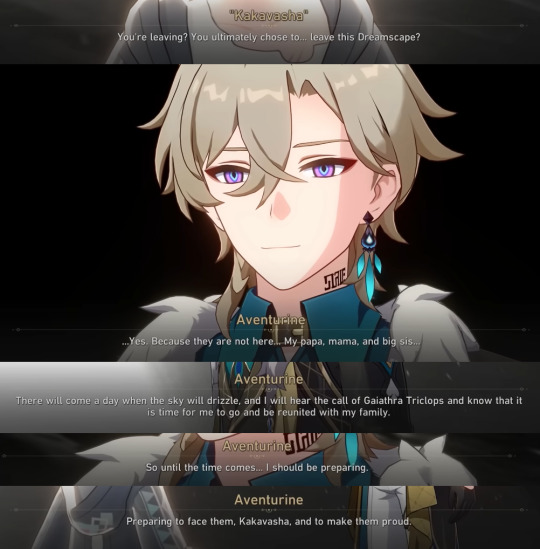
Ratio gave Aventurine a promise: Someone is waiting for you to come back.
But Acheron gave Aventurine a reason: If life is inherently meaningless, doesn't that just mean you are free to give it meaning yourself?
She saved him, as women have been saving him all his life.
Anyway, this has already been horrendously long, but really what I wanted to say is that I think it is absolutely fascinating how consistent Aventurine's writing is when it comes to portraying where his support comes from and who he seeks guidance from. (Psst, just in case you still haven't figured it out, it's women!) In virtually every instance we are shown, we see the message reinforced that women are Aventurine's greatest allies and role models, while male figures are continually positioned to intentionally or unintentionally let him down and cause him distress.
"But women playing the supporting role to a male character is nothing new, Star, why are you so excited by this?"
Because the role women are playing in Aventurine's life is not the subservient supporter and emotional crutch role that female characters all too often play to male counterparts. None of the women in Penacony or Aventurine's past were there to do the emotional labor for him, to be a trophy or prize, or to cater to his needs. They don't exist solely to help him fulfill his character motivations; they aren't following him around waiting for his next request as their only role in the plot.
Instead, with Aventurine's story, we almost have an inversion of gender roles, where the male character eschews the stereotypical "men are leaders, fighters, and stoic heroes" archetype. Instead, no matter how hard he tries to hide it and keep a stiff upper lip, it is clear from 2.0-2.1's story that Aventurine is a deeply insecure, lonely, and explicitly traumatized survivor of genocide, slavery, and exploitation. Unlike most male characters, who are very rarely portrayed as genuine victims--because come on, shouldn't men be strong enough to fight back? Shouldn't men be able to shrug it off when they are hurt, emotionally or physically? (Of course I'm rolling my eyes here!)--Aventurine is belittled, humiliated, emasculated, and victimized on-screen, roles almost exclusively reserved for women, for whom surviving victimization in fiction is seen as noble.
Meanwhile, the women in Aventurine's life take on the roles traditionally given to male characters. They're both emotionally and physically his protectors. Aventurine's sister gave her life to guard his safety; Acheron ensured he could safely pass beyond the river of Nihility into the Primordial Dreamscape. They give him the tools necessary to succeed where he could not succeed on his own. His plan could never have gotten off the ground without Topaz and Jade entrusting their Cornerstones to him. The knowledge and capabilities of the women around him--not their "feminine charms"--are what allow them to help keep Aventurine on the right path even though he does waver. Even women who disrespect him, like Sparkle, still play a positive role in his life, able to provide him insight gained with their own intellect and talents.
When he has no one to rely on and doesn't know what to do, Aventurine is able to continually turn to the women around him, asking for and receiving not servitude or fawning, but their genuine wisdom and guidance.
tl;dr: If nobody else has him, Aventurine knows this random woman he met two minutes ago on the street will have him, because the women in his life literally never let him down.
(It's just so, so good, and ultimately, it should be very clear why Aventurine's story is as popular with women as it is! A+, Hoyo!)
#honkai star rail#aventurine#acheron#topaz hsr#honkai star rail meta#character analysis#there's a bit of#ratiorine#in here too#but mostly I ramble about WOMEN#thematic parallels#thematic parallels everywhere#it's long#I'm sorry but not really#sometimes you act like a normal fan#other times you're me#and write essays that wouldn't be out of place in gender studies class#also I hit the '30 images per post' limit and had to make do#please ignore the terrible merging I did of the photos#don't perceive my MS Paint job
988 notes
·
View notes
Text
I can’t stop thinking about Siffrin and Loop as the knife’s edge between self-love and self-hatred.
To realize that there is a part of you that no one will ever recognize. That you can be so violent towards yourself and so compassionate, that there is a world where you destroyed everything you ever loved and a world where you were saved. To look at yourself and see that you have changed, are changing, every moment of every day, but some things remain the same. To know that you can try to kill the person you once were, but they won’t ever go away. Not really.
To find happiness and solace while knowing that there is still a part of you, somewhere, that is broken and lonely and unreachable, that may not ever know that kind of peace. At the same time, to feel like the people around you love some other version of yourself, someone brighter and better, someone you will always feel disconnected from. In both cases, to resent that broken part of you, that better version of yourself.
To discover, too late, that you can’t do this alone. You need people, certainly. You need people who care about you, who will look for you when you are lost, who will reach out to you in darkness. But even more so, you need the ability to call for help, to guide your people towards you. You need the will to save yourself.
And calling for help is an act of love. And regretting your mistakes is an act of love. And despising the things that have caused you pain is an act of love. It is looking out at the world, eyes narrowed, hands balled into fists, and believing, deep down, that you don’t deserve to suffer. And love is fierce, violent, and destructive. And love begets violence. And there is such a thin boundary between love and hate.
Loop loved Siffrin, and hated him. Siffrin loved Loop, and hated them. As they both loved and hated themselves. As they loved and hated themself.
And looking at your own reflection, at the wrong you have done, and offering forgiveness? Refusing, in the end, to continue to harm yourself? Acknowledging the role you played in your own suffering, and understanding that this does not invalidate the pain you felt back then? The pain you will always feel?
That is an act of love.
That is an act of love.
#first time doing an ISAT analysis#this game changed me#hm I hope this is decent#I really want to do justice by these characters but I projected so hard onto Sif that analysis is a bit tricky#anyway i love them#their entire dynamic#complicated self love and self loathing I adore you#in stars and time#isat siffrin#in stars and time siffrin#isat loop#in stars and time loop#isat spoilers#in stars and time spoilers#madbard rambles
329 notes
·
View notes
Text

a fallen star
--
(do not repost or use w/o permission)
#isat#in stars and time#isat loop#in stars and time spoilers#mood owl does art#mood owl art#fallen angel reference yay#this game has made me crazy#a treat for finishing my quantitative analysis project
345 notes
·
View notes
Text
star trek tos is deeply entrenched in its identity as a 60s tv show for better or for worse (both) but i think retroactively the city on the edge of forever ends up showcasing this more now since its set in a time we can now as 21st century viewers connect with being closer to the time it was produced, rather than the nebulous 23rd. it's interesting because for me i think the single episode informs the way i connect an imagined future to the actual real 1960s the show was written in, particularly in the language and the way relationships between characters are depicted in the way they speak to one another. in that single episode it suddenly feels that the coded language everyone uses, the subtext, the hints and euphemisms is a necessity of the world rather than a feature of the show. and suddenly (for me, at least) that totally shapes the rest of the way i view the rest of the original series. though the way they speak to one another doesn't really tangibly change all that much, when they're placed in the setting of the 1930s the way that kirk and spock speak to each other and about one another entirely shifts.
edith asks kirk in regards to his relationship with spock "I still have a few questions I'd like to ask about you two. Oh, and don't give me that 'questions about little old us' look, you know as well as I do how out of place you two look here." which. well. hello. and later when she asks "Why does Spock call you captain? Were you in the war together?" and kirk says "we... served together" its like yes the obfuscation of their identities and who they are to one another is a necessity of the plot and time travel reasons but i also can't pretend that particular response doesn't color kirks line 2 episodes later in amok time "you've been called the best first officer in the fleet, that's an... enormous asset to me" in a different light. the necessity of secrets and closed doors and frantically having to conceal themselves and their tiny little apartment with a pair of twin beds and ediths "you, by his side as if you've always been there and always will" and "'Captain'? See, even when he doesn't say it, he does" well i can't act like it doesn't change the way i see their enforced professional distance in other episodes, even when they're back safe in their own century. its why The conversation cut from the original harlon ellison script hits seriously i think. it's like a deeply personal confession of desire for a life that could never be: "On my world the nights are very long. The sound of the silver bird against the sky is very sweet. My people know there is always time enough for everything. You would be comfortable there" and a wistful acceptance ("All the time in the world...") in another time in another life in another place it could be but just not this one. spock's endless resignation. well it just changes everything for me. star trek is about the 1960s!!!!!!
#star trek#txt#this mess of thoughts#this city on the edge rewatch was deeply and profoundly moving for some reason this time#i have to wax poetic about it now.#its also like this isnt even scratching the SURFACE of my metatextual analysis of how the subtextual coding of their relationship is not#just a feature or necessity of the show but how it functions narratively and as a part of the social context for the constructed tos future#AAAAAA
280 notes
·
View notes
Text
Sunday’s worldview sucks, his outlook and perception of himself and others sucks… and that’s why he’s so interesting
In honor of his drip marketing releasing tonight (or maybe yesterday for you depending on when I get this out), I’d like to talk about why I think Sunday’s beliefs and perspective is very, very flawed and how his own biases rather than the actions of those who oppose him are what led to his downfall.
Sunday is entirely responsible for his own failure, and that’s exactly why he’s incredible.
This contains mentions of leaks and spoilers for the Penacony quest line… you have been warned
To start with, oh my lord do Sunday’s preconceived notions kick him in the ass.
I think the best example of this is his conversation with Dr. Ratio in which Ratio pretends to betray Aventurine, selling out his plan to Sunday. Now, what’s incredibly interesting about this exchange is that Ratio doesn’t fully lie to Sunday once in this exchange, rather he says half truths and makes vague statements which Sunday himself interprets as being in support of him.
Take what Ratio said the whole, “A scholar knows their position and wouldn’t forsake it for the sake of petty pride.” In retrospect, we know this line is actually referring to Aventurine- aka Ratio is saying he’s not just going to sell him out to Sunday for the sake of information about the Stellaron (which he would get anyways if the IPC attained Penacony, plus Mr. Incredibly Dedicated Knowledge Spreader probably has other means of gaining it then through The Family).
However, since Ratio answered the invitation Sunday gave him, Sunday assumes that Ratio is on his side, believes his cause is righteous, and that he won Ratio over with offering him information about the Stellaron, therefore making that previous statement of Ratio’s null, because Sunday interpreted it as, “convince me this is worth my time + prove to me you’re correct,” when it really meant, “there is no way in hell I’m about to sacrifice my friend to you, and there is nothing you could offer me to make me do so you crazed lunatic.”
But why did Sunday not weigh the options? Why did he unquestioningly believe his perception of the situation was the correct one?
Well- partly it’s because Ratio and Aventurine were doing their damndest to make it seem like they hate each other and that their plan was going off the rails.
But the more important part is that even without Ratio saying a word or even accepting the invitation, Sunday already believes he’d be on his side.
Let me demonstrate this through Sunday's perspective:
I am a righteous person, I am doing the correct things, my worldview is the correct one. Dr. Ratio is also a righteous person who seems to be doing the correct things. Therefore, since we are both on the side of good, and Aventurine is clearly not on that side considering his status as Stoneheart and his negative relationship to Ratio, then Ratio will naturally want to be on my side. After all, the good guys work together, do they not?- and together will vanquish this evil villain.
This perspective is a simple one, but Sunday’s unshaking belief (up until the end of 2.2) that he is 100% in correct and in the right, that any and everyone who he also perceives to be in the right (like Ratio) would believe/side with him without truly needing to be convinced. Sunday doesn’t come out the gate offering the Stellaron information- he only keeps it as a backup just in case.
However, this is complicated because Sunday is also not an idiot, and he’s extremely paranoid, so he’s going to make sure that the way he views the world is 100% correct on the off chance he’s wrong which could foil his plans- which is why he invited Ratio in the first place. Nevertheless, this isn’t him hunting for new perspectives, but rather him desiring to prove himself right again, which is a bad thing because Sunday is very much not right.
A perfect world is a perfect pris- *gets shot*
Reference that approximately 2 ½ people will get beside, Sunday’s ideology that he is fully confident in.. sucks. It sucks ass, it’s terrible, and let me explain.
I’m not going to try going over all the little intricacies to how the dreamscape works because I a) don’t know and b) don’t particularly care because they aren’t relevant to the argument I will be making- which is that Sunday’s ideology is inherently flawed and immediately falls apart under scrutiny.
Essentially, he desires to create the perfect fake reality, enveloping the whole galaxy in Ena’s dream and fulfilling their every desire and whim within it, with himself as the sacrifice to allow it to exist. The seven rest days, no illness, no pain, no challenge, you get the idea.
And, this perfect world paradoxically sucks ass because of its perfectness.
Improving society is great, eliminating hardship is great, increasing quality of life is great.
But declawing reality itself- absolutely not.
I’m going to try to explain this through my favorite strangely specific anecdote- the process of obtaining diamonds in Minecraft.
Stay with me now.
You essentially have two options- go out and mine them yourselves the hard way, which takes hours, gives you less diamonds per the amount of time spent on it, and likely with you exhausting some of your resources like food, torches, and tools which you will need to replenish.
Or.
You can just.. get them from creative mode or commands, and you can get as many as your heart desires.
However, despite the fact that option one is harder, gives you less diamonds and takes significantly more time, I, as well as hopefully you, would pick it every time (at least in a survival world, although honestly idk why you would even need pure diamonds in creative).
And that’s because the first option is rewarding.
You did not earn the diamonds you easily and magically summoned into your inventory, there is no struggle, no journey, no challenge to it, therefore it feels entirely unremarkable, as compared to the feeling you (hopefully) get from mining diamonds, which makes you happy because you earned it. Yeah, it was harder, but the process itself is fun- the anticipation of not knowing when you’re going to find them, if at all, the danger, the fighting and digging and mauvering you will have to do in the process.
And with this unconventional example, the fatal flaw with Sunday’s ideology is revealed- it’s boring.
It’s boring as shit.
Yeah, for the first few months or even years it might be enjoyable- having everything you could ever want served on a silver platter. However, humans are a) inherently a bit greedy and b) desire challenge, and this scenario fulfilles neither of those things. Naturally having everything means your desire for more can never be fulfilled, leaving the wanter forever unsatisfied, whereas in the real world, things are truly out of your reach, meaning that even if you never end up getting them, they are still a tangible thing just out of reach… as strange at it sounds, we like being tantalilus-ed more than you think. After all, if what you want is so easy to get, you will never run out of things to want, and eventually that gets draining.
Continually, if everything is easy, if everything is just right there whenever you want it- existence itself no longer has stakes.
And that’s the problem, because much like how a story with no stakes is extremely hard to find compelling, a life with no stakes feels boring at best and downright pointless and meaningless at worst.
I’m just saying, there is a reason why the Nihility was such a strong presence and problem in Penacony.
Anyways, like with the diamond problem, a lack of stakes means that nothing you do feels rewarding, because you didn’t truly earn it.
Which is where the Sunday’s idea of a “perfect” reality falls apart, because the most enjoyable reality for humans to live in is not one literally devoid of any possible flaw.
So why does he believe in it? When it’s so clearly flawed?
Well, it’s because Sunday doesn’t think a better alternative exists.
The world made you this way.. and you chose to continue what it started.
I’m sure I don’t need to repeat the story of the Charmony Dove all over again because trust me, we’ve all heard it before. Nonetheless, it reveals something important both about Sunday’s personality and his ideology- he’s fundamentally a defeatist.
He doesn’t believe that there is any alternative for the dove, that it could ever be able to fly again with its deformed nature, so instead of being “cruel” and letting it “inevitably fall to its death,” he’d rather keep it in a cage all its life where it has no freedom, but at least it would he alive and “happy”.
And this is where his defeatism reveals itself- Sunday doesn’t believe reality itself can get better because improving it when there are so many factors and things out of your control is hard at best and impossible at worst. Therefore, he resorts to creating an escapist, false version of it- a perfect golden cage, because constructing that is far, far easier than trying to help the dove fly again.
The universe has endless possibilities, if Robin and Sunday had tried hard enough, they probably could have found a solution. Sure, they were both children, so the capabilities necessary to even attempt that were likely far out of their reach. However, it was still possible, but Sunday doesn’t believe in possibilities- he believes he’s right above all else, which is where that stubbornness and arrogance comes into play again.
Sunday doesn’t think better solutions than his exists, and he believes everyone would could possibly stand in his noble way are either villains, or horribly misguided; so it’s his job to show them the light.
This is why he lets the Express Crew + Firefly try to change his mind- Sunday wasn’t actually interesting in shifting his perspective, or really what they wanted to say. Rather, he just wanted to let them say there peace, because well, Sunday’s a good, righteous person (at least from his perspective), and good, righteous people listen to others. Good, righteous people will let these poor, ignorant souls offer their foolish words before exposing them to the harsh truth- or at least that’s how Sunday sees it.
Moreover, this also explains his arrogance. If he believes his worldview is the sole correct one, then why listen to anyone else? He’s this world's savior, or at least he’s been raised to believe that- so why not relish in it? He enjoys punishing Aventurine, enjoys the bastard who stood in the way of Sunday’s plans, shrinks away in “defeat” and get what he “deserves.” Despite how miserable it sounds, Sunday also takes pride in having to be a martyr to bring about his beautiful dream. The belief that he is a selfless, good person is a selfish desire of his, even if a genuine one, and it’s what leads to his downfall.
Sunday could have actually listened. He could have reevaluated his loss to Aventurine and realized it was not through the others clever deception, but through his own biases. He could have actually taken the Express’s and Firefly’s advice. He could have looked for other avenues to help the people he truly does care about.
Despite Gopher Wood’s manipulation- Sunday’s decision to go forward with the pain is entirely his own, because he truly believes- even with all the evidence for the contrary- that he is correct.
And that’s why he fails. Not because of the Express. Not because of Ratio. Not because of Aventurine. Not because of Gopher, or even the rest of The Family.
No, Sunday fails because he is flawed, and he is wrong, and he is the arrogant, selfish and biased one, and his worldview is wrong.
So what now?
This might have seemed like I think Sunday is pure evil and irredeemable, but I think it’s quite the opposite.
He has very good intentions, and he does genuinely care about it the well being of other people around him. He gives Aventurine a chance to prove his innocence, even if he never intended on changing, he does listen to what the Express + Firefly have to say. He pauses when Robin shows up, as she’s the one person (until the very end) he’s actually willing to accept the perspective of. The whole reason he ended up here in the first place is because Gopher Wood twisted Sunday’s good intentions into a fatal arrogance and utmost belief in a flawed worldview.
However, what really sells me on Sunday’s goodness is when eyes widen at that final moment, the light draining from him as he realizes he is wrong.
And once Sunday realizes he is wrong, those flaws that bind him can finally be examined and improved upon, as they all stem from that worldview he no longer believes in.
His whole life, Sunday has been enacting out someone else’s plan for him, even if he’s come to internalize it over time, at the end of the day- it was never his, and without it, he’s empty.
Which is exactly why the only place he can go now is the Express, and the only thing left for him is redemption and growth.
Dan Heng is right- Sunday has a noble soul, and now that he has stopped believing in himself, he’s no longer shackled by the past either. Improvement or utter demise (in a likely nihility-flavored manner) are his only options remaining.
I understand a lot of people want to see him become a Stellaron Hunter, but imo, that just does nothing for him. He’d still be following someone else’s path/script, and Mr. I Will Sacrifice My Whole Existence To Become The Sun To Illuminate These Wandering Souls probably wouldn’t be so on board with the whole.. terrorism part of being a SH. Like yeah, they are our friends (kinda), but they absolutely kill innocent people and cause millions of dollars in property damage to people who don’t deserve it.
Also, being on the Express Just Makes Sense. This is a game about choices, a game about accepting the mistakes of your past, but not letting them define you in order to move on and forge a better future for yourself and others- with the Astral Express + Trailblaze as a concept being the literal embodiment of it. There’s a reason when you switch to the Trailblazer’s POV in stories, it includes Kafka’s most important words to us- “When you have the chance to make a choice, make one you won’t regret.”
Therefore, I hope the choices Sunday will make in 2.7 are ones he’s proud of, and I can’t wait to see how exactly they get him on board with the crew, because there still is a LOT of development he needs to do before then.
Anyways, thank you so much for reading, and if you have any thoughts I’d love to hear them. This was a stream of consciousness mess, but I hope it was still valuable nonetheless! Also if you are reading this on the day it was written, I hope we don’t get disappointed by his drip marketing!
#Highkey did not proofread this to make sure it flows well so if it gets a bit messy I apologize#I had to somehow turn the disjointed musings of my brain into an actual analysis and it probably shows#Somehow managed to make this damn thing 2.2k+ words because of that though#That I wrote in like an hour and a half LMAOO#I’m unstoppable once I am hooked on a topic#Again thanks for reading!#Sunday#hsr Sunday#Sunday hsr#sunday analysis#Yes I should have mentioned Gallagher in this but I forgot and by the time I remembered him#He’d only serve as just another example#Sunday fans might annoy the hell out of me a lot of the time#But he’s a great character#I just wish they would actually acknowledge his flaws… that’s literally the whole point of him#No Sunday was not onto something 😭 he was very far from something infact#Hsr#honkai star rail#hsr analysis#More tags than the amount of hatred I have for [redacted] Sunday ship#ifkyk#anyways
242 notes
·
View notes
Note
Up until yesterday I was STARING so very hard at the siffrins. I was so absolutely sure that there would be a difference between them in their "hidden" fit and I think I fiiiiinalllyyyyyy found it and am confident abt it. Not eyes, not faces (with the eyepatch at least)
The way you draw the hair. Loop gets a sharper triangular ahoge in 50% of cases, and they DEFINITELY have the sharp, more straight huge cowlick in front. Always
THANK U! i noticed a good amount of people have been noticing I've made these details so here's my thought process in full!!!!



Again, thank you for reading!!!!! For anyone curious, here's a link to my fan-webcomic: Tag In/Tag Out! The premise is that Loop comes back as a Siffrin, and instead of explaining why there are two of them, the two tag team as one person in secret.
#in stars and time#isat#isat fanart#isat fancomic#art analysis#i think way too hard about this kinda stuff lol
225 notes
·
View notes
Text
i'm finally getting around to reading Killing Time by Della Van Hise.
you know, the Star Trek book that was so gay that it was recalled and reprinted with over 50 changes.
I got my hands on a first edition copy from Thriftbooks and decided to use a sticky tab every time something "spirk" happened

I'm only halfway through.
update its very fucking gay
#this is an unparalleled reading experience#nothing that happens in this book would phase me if i was reading it in a fic#but because this is an official published Star Trek tie in novel#im going bananas#screaming at almost every page#star trek#star trek tos#jim kirk#spock#spirk#k/s#let me know if you want a thorough analysis when i finish#or dont because ill probably do it anyway#killing time#star trek killing time
2K notes
·
View notes
Text
Introducing Character Trope: STEBS (Stoic Traumatized Epic Bastard Softie)
I have tried to look this up on TV tropes, but it does not exist. Not officially, at least. So I decided – I'm introducing new trope. It already exist, someone might as well try and give it a name.
And yeah, this acronym SUCKS, feel free to come up with a better one! But let's talk about what a "STEBS" character is for me, because I've come to the conclusion that it is actually my favorite character type.
First, context. Ever since I've read TCF, I have come across other medias and I was often like, "Hey, this character is basically just like Cale!" – which I feel like, it isn't really fair? I mean, Cale is a great and complex character, but making this comparison constantly makes me feel like I'm undermining the complexity of OTHER characters. Just because Cale shares similarities with other characters doesn't make them copies of him.
So, what exactly is a STEBS?
1) Stoic
This character has a very specific way of acting in non-confrontational situations. It can be respectful, it can be casual, but it is neither extremely friendly nor extremely rude. It's in a calm, pleasant zone, where the character treats others like... well, people. The character doesn't make themselves superior nor inferior, it doesn't matter to them if the other is a beggar or a king. They just are, calm and casual. That's what makes them stoic - NOT lack of expressions or emotions, or lack of humor. It's the way they carry themselves on the regular. This character type makes others feel relaxed because of it, and subconsciously encourages trust and friendship (much to the character's confusion). They will also make a great educator because of it, and will likely act as a mentor or a teacher more than once.
2) Traumatized
Despite the stoicism in their behavior, they actually have a complicated background. Commonly an orphan, even though not always, this person has been through a LOT. But, they don't usually express it. Seeing this character cry or break down is EXTREMELY rare and always a very important scene in a story. It's not that they're not emotional or they always try to bury their trauma, although that does usually apply to them; they're just not vocal about it due to their personality. But oh boy, are they traumatized! Wait for that reveal later in the story though, when it actually becomes plot-relevant.
3) Epic
Despite the character being a stoic type, with a backstory that makes them crave very simple things – be it retirement, respect from their peers, a safe house to live in, a stable job, a family, a specific successful career – they are actually freaking epic where it comes to things they do. They either have great knowledge, memory, or skills in a particular field and they always manage to surprise others with just how competent they are. It can be literal combat skills, magic, being a life-saving surgeon, or even a therapist. But whenever they get their chance to shine, they become a real star.
4) Bastard
A trait that adds a surprising amount of charm and humor to their other traits. Being stoic makes them likeable, being traumatized makes them sympathetic, being epic makes them cool – but being a bastard? It actually just means they're mischievous and have a penchant for chaos. Because this character is meant to make changes in the narrative, like an accidental revolutionary or a transmigrator, they have to possess a cunning streak that might seem mean or selfish at first, but actually never crosses the line into making them despicable. It just makes them an occasional manipulator, but it's usually portrayed in a way that still makes it impossible to make you hate them. In fact, it makes you love them more for it. They are not naive, even if they can be oblivious or silly at times; being a bastard to those who deserve it means being able to get out of sticky situations that would be problematic for paragon heroes. It includes stuff like acting, pranks, cheating, manipulation, shady deals, gambling, stealing, and even criminal behavior, that is actually very understandable due to their specific circumstances.
5) Softie
And if all the previous traits haven't convinced you to love this character yet, the last one surely will. This character, despite having a mean streak, is in fact never mean to innocent people. Actually, they are surprising soft and/or sentimental, especially towards the helpless and children. This character will probably have at least one animal sidekick, at least one paragon protagonist type on their payroll, and most importantly an adopted child - if the previous two don't already fill that spot. This character will make excuses of course, they will claim that they are taking care of others for their own benefits. But you will see quickly that they don't treat others like a heartless manipulator, but more of an overprotective mother-hen. This character, no matter their gender, will eventually become the typical Mom Friend. They will make sure everybody eats well, sleeps well, they get their allowance, pack their lunch before heading out to participate in the plot and probably try to sacrifice themselves for them more than once. They will of course become the mentor figure on top of it, and possibly even be a straight up legal guardian and/or teacher to other important characters.
And this, my friends, is what I call a STEBS character. While it outlines a general, it's not a strict definition, mind you. Even if a character exhibit one trait less than the others (for example not being much of a bastard, or not being very stoic), it still counts as long as you still recognize them as fitting in this "category".
Characters in this category include:
Cale Henituse from Trash of the Count's Family
Obi-Wan Kenobi from Star Wars
Aizawa Shota from My Hero Academia
Kakashi from Naruto
Remus Lupin from Harry Potter
Faramir from Lord of the Rings
Kim Dokja from Omniscient Reader's Viewpoint
Rimuru Tempest from That Time I Got Reincarnated as a Slime
Park Moondae from Debut or Die
Won Hwabu from I Reincarnated as a Legendary Surgeon
And many, many others.
Let me know if you have a better name for this very specific character type!
#character analysis#writing#tropes#stebs character#tcf meta#trash of the count's family#star wars#my hero academia#naruto#harry potter#lord of the rings#omniscient reader's viewpoint#that time i got reincarnated as a slime#debut or die#i reincarnated as a legendary surgeon
154 notes
·
View notes
Text
I always find it a little funny when the fandom treats "bright one" as an important title when in context it's a lot closer to:
"Hey traveler!"
"Which one?"
"The one in white!"
"Oh! Siffrin, he means you."
Like okay, you can argue it's partially because the darkless hair and cloak could be important to the Island, but it's mostly because The King Also Doesn't Know Their Blinding Name and the easiest way to distinguish the two was to point to the one practically glowing with how much white he's wearing.
#(And also the King doesn't care to know whatever name Siffrin chose for himself. After all it's not like Siffrin remembers their OG name)#(And in context of the Island the King cares far more about preserving who Siffrin is in context of the Island than who he chooses to be)#anyway enough serious analysis in the tags in the funny text post#isat#in stars and time#the king isat#siffrin isat#isat spoilers#right island stuff... spoilers....
154 notes
·
View notes
Text
The Intelligentsia Guild is, according to its wiki, is a group that is financially supported by the IPC. Meaning, that by default, those within the Intelligentsia Guild are in a lower position in power than those in the IPC.

Yet, Ratio is almost always showcased alongside the higher ranking IPC members, commenting under their social media posts (albeit only Aventurines but I digress), being very frequently shown alongside them in promotional material, and even having a reference in the actual IPC trailer.
Now, it's been made clear already that he does have direct relations with the IPC, as seen in the Penacony story, but trying to figure out what these relations exactly are is where I'd like to look.
It is clear he isn't a direct member of the IPC, seeing as he is exclusively introduced as a member of the Intelligentsia Guild, however, in his third character story Margaret states that he received an invitation from the IPC. The exact details of this invitation are not given, but it is described as carrying an amount of solemnity. This, and the fact that during the Penacony story Ratio states, "…only IPC senior members and related members can access it - but I happen to be among them." THIS as well as the fact that in the space station mission, he is introduced as a Delegate from the IPC.
Now, I believe that Ratio is not necessarily a direct member of the IPC, but more an honorary member. I think this is mostly because he is never mentioned as a member of the IPC, only the Intelligentsia Guild. However The Intelligentsia Guild is heavily implied to be an extension of IPC of sorts, and many Intelligentsia Guild members likely do work for IPC, Ratio included. It's clear in his third character story that the IPC is aware of his existence specifically, and I find it easy to believe that his intelligence is used for the benefit of the IPC, especially since in that character story he was sent that letter during the test-firing of an anti-planetary weapon he had developed.
I think he refuses to accept a direct job with the IPC, not wanting that title before or after his name when he's introduced after knowing about all the things that the IPC has done.
I don't think Ratio would want to be associated directly with the IPC, instead being perfectly content to remain in the Guild, leading to yet another faction that he will never join due to his humanity and care for people.
#school is kicking my ass but at least i have dr veritas ratio#amen#i was in actual tears when it was confirmed no ratio rerun yet i think im too attached to him guys#spelling Intelligentsia was a genuine nightmare this entire time#people think that the IPC is like the government due to the taxs and such#but its actually a megacorp like Disney#★ – posts!#★ – analysis!#dr ratio#dr veritas ratio#veritas ratio#hsr ratio#hsr dr ratio#honkai star rail#hsr
307 notes
·
View notes